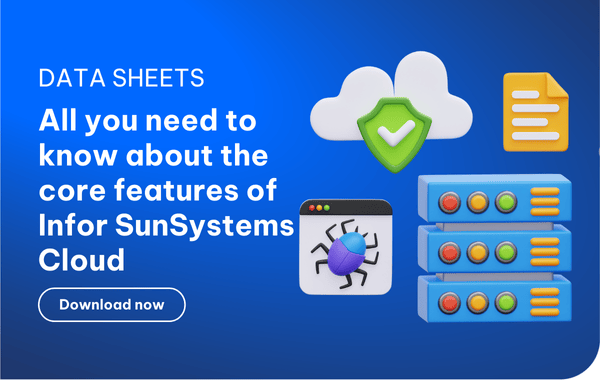Data plays a vital role in empowering leaders to not only stay informed about their current financial performance but also contribute to financial planning and analysis, as well as ensure businesses maintain compliance.
Spreadsheets have emerged as the universal solution for tackling diverse data, analytics, and performance management needs across the business.
As organisations continue to embrace the digital revolution and incorporate a combination of cloud-based and traditional back-office platforms, the sheer volume of data generated on a daily basis is becoming overwhelming. Users of spreadsheets are realising the significant challenges that this application presents.
Read more: From On-Premises to Cloud: Strategy for a Successful Financial Management Transformation

Contents
- Why are spreadsheets popular?
- Five common spreadsheet-driven processes that modern cloud solutions can replace
- Budget and Planning
- Financial consolidation
- Business intelligence and analytics
- Customer and supplier communication
- Auditing and compliance
Why are spreadsheets popular?
Spreadsheets have long been a popular tool for both individuals and businesses due to their versatility and ease of use. They provide a structured grid format that allows users to organise, analyse, and manipulate data in a visually intuitive manner.
This simplicity and familiarity make spreadsheets widely accessible. Moreover, spreadsheets offer a wide range of functionalities. Many spreadsheet software programs offer advanced features such as macros and formulas, allowing users to automate repetitive tasks and perform complex calculations, not just create charts and graphs or filter data.
This flexibility makes spreadsheets adaptable to different tasks and industries, from budgeting and financial analysis to project management and inventory tracking.
Read more: 7 Worst Financial Fiascos Caused by Excel Errors
5 common spreadsheet-driven processes that modern cloud solutions can replace
While spreadsheets have been widely used, they do have certain downsides that make them less favourable compared to cloud accounting solutions.
Nearly 90% of spreadsheets are riddled with errors, causing frustration and inefficiency for users. A staggering 61% of users waste valuable time collecting data, while 43% express discontent with spreadsheet software like Excel.
Organisations undergoing digital transformation are beginning to recognise the benefits of moving away from spreadsheets to adopt more advanced, robust, and cloud-based infrastructure, such as SaaS financial management and analytics solutions, which offer real-time information access and a high level of security.
Cloud solutions have been shown to automate at least five business operations that yield greater value when compared to spreadsheet-driven processes.
Read more: Fundamentals of Cloud | Public v Private, SaaS v Hosted, Multitenancy
1. Budgeting and planning
Running a budgeting and planning process using spreadsheets is fraught with danger. Chaos and a loss of control will ensue if each accountant wants to modify or combine data from different spreadsheets.
Not to mention, managing the correct file version, tracking changes, reconciling data, and ascertaining if the original formulas and logic are still the same have always been nightmares.
The security risk of using a single spreadsheet file for company-wide budgeting is another factor to take into account. If an organisation plans and budgets for numerous goods across divisions, locations, and regions, multiplying these inaccuracies together may lead to hundreds of potential errors, which would require hours of work by the financial department to verify the accuracy and consistency of the data.
Cloud solutions provide dedicated budgeting and planning modules that offer advanced functionalities beyond the capabilities of spreadsheets.
Along with centralised data storage and real-time collaboration, users can access and work on the same data simultaneously. This eliminates the need for manual consolidation and reconciliation of data, reducing errors and improving data accuracy.
Furthermore, cloud solutions provide robust security measures, including controlled user access and encryption protocols, to safeguard sensitive financial data. This reduces the security risks of using a single spreadsheet file for company-wide budgeting.
Cloud solutions streamline budgeting and planning with workflow management, automation, and advanced features. Users can easily track, review, and approve budget submissions, ensuring compliance, while automated calculations and built-in formulas ensure consistent and accurate results without the need for manual verification.
Read more: Don’t Let Your Data Lake Become a Data Swamp – Here’s What You Can Do
2. Financial consolidation
When relying on spreadsheets for financial consolidation, gathering data from multiple source systems is incredibly time-consuming. The manual extraction and integration of data from different platforms or databases can lead to errors and inconsistencies, making it difficult to ensure the accuracy and completeness of the consolidated financial statements.
Moreover, managing multi-currency data in spreadsheets can be challenging as it requires careful attention to exchange rates and calculations. Any errors or inconsistencies in currency conversion can impact the accuracy of the consolidated financial statements and create difficulties in comparing financial performance across different entities or regions.
Read more: 4 Deadly Sins of Financial Consolidation
Not to mention, spreadsheets often struggle to handle complex intercompany transactions, such as eliminating intercompany balances and transactions between subsidiaries. Ensuring proper elimination and consolidation of these transactions is crucial for presenting an accurate picture of the financial position and performance of the entire organisation. Without a robust system in place, the manual handling of intercompany transactions can be prone to errors and inconsistencies.
Organisations with complex ownership structures, such as subsidiaries, joint ventures, or equity investments, face additional challenges. Managing the consolidation of financial data across different entities with different ownership percentages and structures can lead to errors and complexities, which spreadsheets may not have the necessary functionalities to handle.
This is where cloud solutions excel by automating the process and reducing manual effort. They integrate data from various sources and subsidiaries, automatically consolidate financial statements, and generate accurate and up-to-date reports.
With built-in consolidation functionalities, these solutions ensure data integrity, eliminate errors caused by manual consolidation processes, and provide a streamlined workflow for financial consolidation tasks.
Finance teams can easily map and reconcile accounts, perform intercompany eliminations, and generate consolidated financial statements with a few clicks.
3. Business intelligence and analytics
Due to the demand for self-service reporting from end users, organisations that heavily rely on IT for reporting and analysis often resort to using spreadsheets. This results in outdated or unrelated information being provided by IT.
Cloud solutions offer robust analytics capabilities, advanced data visualisation tools, dashboards, and reporting functionalities to present financial data in a more meaningful and insightful way. In-context analytics, embedded analytics, and machine-generated insights provide the business user with more relevant, real-time information.
Cloud solutions can also integrate with various data sources, including enterprise resource planning (ERP) systems, customer relationship management (CRM) platforms, and external data feeds. This allows for real-time data integration, ensuring analytics are based on the most up-to-date information.
With access to self-service features like ad hoc querying and drilling down to transactions, users, regardless of which department they belong to, can generate reports and obtain insights that empower them to make informed decisions.
With powerful analytics features, teams can analyse trends, identify patterns, and gain deeper insights into financial performance. They can create interactive dashboards and reports that provide a holistic view of the organisation's financial health without IT intervention.
Read more: Networked Analytics - the Next Wave of Business Intelligence
4. Customer and supplier communication
Spreadsheets are not designed for real-time collaboration, making it challenging to communicate and collaborate effectively with suppliers and customers.
Sharing spreadsheets via email or other file-sharing methods can lead to communication gaps, as multiple versions may exist simultaneously. It becomes difficult to ensure that all parties are working with the most up-to-date information, leading to potential miscommunication and delays in decision-making.
Cloud solutions often include integrated modules for CRM and supplier management. These modules centralise customer and supplier data, enabling seamless communication and collaboration.
On the other hand, cloud financial management solutions enable finance teams to access customer and supplier information, track transactions, manage invoices, and communicate directly within the system.
These solutions eliminate the need for manual record-keeping in spreadsheets and provide a unified platform for managing customer and supplier relationships, streamlining communication, enhancing collaboration, and improving data accuracy.
5. Auditing and compliance
Spreadsheets also lack robust audit trail features for validating data and maintaining a clear record of audit activities. Without a comprehensive audit trail, it becomes challenging to demonstrate the accuracy, reliability, and completeness of audit procedures and findings. This can hamper the ability to meet regulatory requirements and address inquiries from auditors or regulatory bodies.
Read more: Why You Should Strive for an Efficient Financial Close
Cloud solutions offer enhanced auditing and compliance capabilities, user permission controls, and data security features, ensuring accountability and data integrity.
Cloud solutions track and log all user activities, allowing for comprehensive audit trails that facilitate regulatory compliance and internal audits. User access can be controlled and restricted based on roles and responsibilities, reducing the risk of unauthorised data manipulation.
Additionally, cloud solutions often offer built-in reporting functionalities to generate compliant financial statements. They streamline the reporting process, reducing the manual effort and potential errors associated with spreadsheet-based reporting.
Despite their shortcomings, spreadsheets are here to stay and will continue to be popular. They are a powerful and versatile tool, especially for businesses with simpler financial processes. However, as businesses grow and evolve, spreadsheets may no longer be sufficient to meet their increasingly complex financial needs.
Cloud solutions are no longer limited to big enterprises with large budgets and ample resources. Even smaller businesses can now benefit from the innovative capabilities offered by the cloud. With a pay-as-you-go subscription model, they can easily scale their system up or down based on demand.
In addition to scalability, the cloud offers numerous other advantages, such as real-time analytics, collaboration, and automated workflows. These benefits are too valuable to ignore.
Curious about how cloud software, specifically a SaaS financial management solution like SunSystems Cloud, can transform your finance function? Take a look at our comprehensive 7-in-1 information kit below. It is always wise to explore different options before settling on the one that best suits your company's specific needs. Begin your exploration with TRG Blog - your trusted source for research and insights!
 English
English  Vietnamese
Vietnamese 



